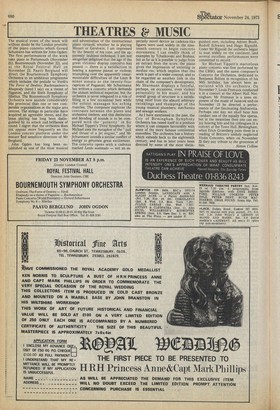THEATRES & MUSIC The musical event of the week will
without doubt be the London premiere of the piano concerto which Gerard Schumann has written for John Ogden. The first performances of the work take place in Portsmouth (November 21), Bournemouth (November 22), and at the Royal Festival Hall on November 23. Paavo Berglund will direct the Bournemouth Symphony Orchestra in an ambitious programme which includes the prelude to Verdi's The Force of Destiny, Rachmaninov's Rhapsody (need I say) on a theme of Paganini, and the Sixth Symphony of Sibelius. The Bournemouth Symphony Orchestra now sounds considerably less provincial than one or two comparable organisations in the major arts centres. The strings in particular have acquired an agreeable sheen, and the brass playing has long been distinguished by its attack and brilliance of sound. I regret that the orchestra does not appear more frequently on the London concert platform under the mature and sensitive direction of Mr Berglund.
John Ogden has long been established as one of the most musical
and adventurous of the international piano virtuosi; whether he is playing Mozart or Gershwin, I am impressed by the beauty of his tone, and his apparently faultless technique. I am not altogether delighted that the age of the great virtuoso display concerto has passed — there is a satisfaction in hearing a supreme pianist or violinist triumphing over the apparently unsurmountable difficulties of the Liszt B minor sonata or the twenty-four caprices of Paganini. Mr Schurmann has written a concerto which demands the utmost technical expertise, but the orchestra is never relegated to a role of filling in a few occasional bars while the soloist massages his aching muscles. The composer explores the contrasts between the piano and orchestral timbres, and this distinction and blending of sounds is to be compared with the ' polarity ' in Sir Michael Tippett's Third Symphony. Sir Michael uses the metaphor of the " pull and thrust of a jet engine," and Mr .Schurmann intends a similar conflict of energy to generate great excitement. The concerto opens with a cadenza marked Lento sostenuto — not an es
pecially novel device as cadenza-like figures were used widely in the nineteenth century to begin concerto movements; I can readily think of examples by Tchaikovski and Brahms, but as far as it is possible to judge from an extract from the score, the piano gives the impression of entering in medias res, which implies that the work is part of a wider concept, and to be regarded as another link in the chain of the composer's development, Mr Shurmann displays a forceful, perhaps, on occasions, even violent personality in his music, and his overall group of structure is a satisfatying relief from the absurd arbitrary twinklings and thumpings of the young musical plumbers, mechanics and sewage workers.
As I have mentioned in the past, the City of Birmingham Symphony Orchestra has raised itself to a position where it can compare favourably with some of the more famous continental ensembles. The orchestra has a history which extends back to the eighteenth century, and has in later years been directed by some of the most distin guished men, including Adrian Boult, Rudolf Schwarz and Hugo Rignold. Under Mr Rignold the orchestra began to tour widely on the continent, and several excellent performances were committed to record.
Sir Michael Tippett's marvellous piano concerto was first performed by the CBSO, and the same composer's Concerto for Orchestra, dedicated to Benjamin Britten in recognition of his 50th birthday, has always been associated with the orchestra. On November 7, Louis Fremaux conducted it in a concert at the Albert Hall, Nottingham. Mr Fremaux is a keen exponent of the music of Janacek and on November 15 he directed a performance of the' fascinating Sinfonietta. Perhaps one day we shall hear him conduct one of the equally fine operas, but in the meantime then one can enjoy hearing him and his colleagues in a concert at the Town Hall, Birmingham. when Erich Gruenberg joins them in a reading of Britten's unduly neglected Violin Concerto, when on November 22 they pay tribute to the greatness of him. Simon Collins


































 Previous page
Previous page